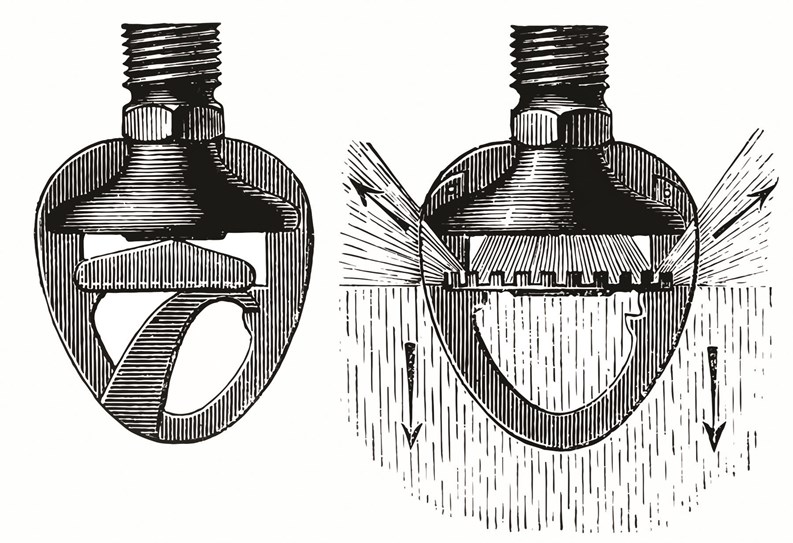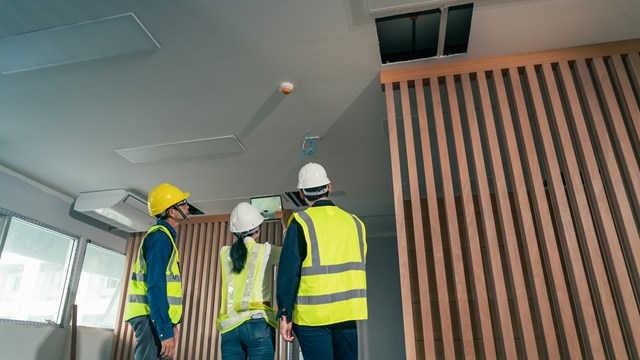While most often the exception and not the rule, fires in high-rise buildings do occur. Whether it’s a scary-but-manageable kitchen fire or a four-alarm blaze involving multiple units or even floors, smoke alarms, sprinkler systems and flame-resistant building materials can minimize property damage and personal injury. While most building codes and legal requirements about fire safety equipment is fairly cut-and-dry, in recent months, there has been debate regarding language in the Condominium Act and the Florida Fire Prevention Code about whether buildings with a height of 75 feet or more have to retrofit their sprinkler systems or opt out by December 31, 2016.
Legalese
“Several years ago, the Condominium Act was revised to remove the word ‘high-rise,’ which refers to those condominium buildings that are greater than 75 feet,” says Jeffrey A. Rembaum, an attorney with the law firm Kaye Bender Rembaum, which has offices in Pompano Beach and Palm Beach Gardens. “However, when you read the present version of the statute, it implies that all condominium associations, regardless of height, are required to either install or retrofit fire sprinklers or make the decision to opt out.”
John Preston, division chief of the Oakland Park Fire Rescue, explains that the opt-in/opt-out rule applies to high rise units only—eight floors or higher. “It was a push by lobbyists to give high-rise management companies without sprinkler systems to not have to retrofit them,” he says. “Low-rise, mid-rise and single family or duplexes are already exempt. For a high-rise building to opt out, a life safety engineering study must be completed—at a cost of approximately $80,000.”
The issue becomes more confusing in that the Division of Florida Condominiums, Timeshares and Mobile Homes has publicly stated that regardless of height, all buildings must install sprinklers unless they opt out by December 31, 2016.
On behalf of the Dory Villas on Lake Miona Condo Association in Sumter County, attorneys Alan Garfinkel, Erik Whynot and Dara Lahav filed a formal petition with the Department of Business and Professional Regulation (DBPR) on August 29 of this year. They are seeking an expedited declaratory statement regarding Florida’s fire sprinkler opt-out statute.
“Unfortunately, there is much confusion and misinformation circulating regarding the upcoming sprinkler opt out law and its fast approaching deadline,” Whynot notes in the petition. “The only definitive ruling would come from either the Florida Legislature or an appellate court, and neither will happen before your board must act.”
“We researched and determined the fastest way to obtain definitive guidance was for us to take it upon ourselves and immediately file a formal petition with the DBPR,” Lahav writes in the petition. “The DBPR must respond, and when it does, we will have a precise and binding decision regarding who the statute applies to and what the statute actually means. We anticipate the DBPR responding to our expedited petition very soon, given the fact that thousands of condominium property owners will be affected.”
Donna DiMaggio Berger, attorney and shareholder at the Fort Lauderdale firm Becker & Poliakoff, explains that due to the efforts of the Florida Bar’s condo committee and members of her firm, the Division of Florida Condominiums has backed off its original stance.
“Thus, there really is no longer any need to have a dialogue with the division on this topic, as the division does not have the authority to interpret or enforce the Life Safety Code,’ says DiMaggio Berger. “Any attempts to have the division weigh in further on this topic will likely be denied due to lack of jurisdiction.”
Old Law, New Statute
While this decision for boards to opt out or opt in is a topic of concern and debate, the Florida Legislature first enacted law 718.112(2)(l) in 2003. Legal pros say the waters became muddied in 2010 when the language of the statute (Chapters 718 and 719) changed removing the definition of a high-rise building as being greater than 75 feet.
According to DiMaggio Berger, “The issue of which buildings should opt out of the sprinkler retrofit prior to the December 31, 2016 deadline was already a complicated analysis but has recently become more complicated as a result of a lot of misinformation being put out there by well-intentioned but uninformed individuals as well as some communities looking to rely on free advice rather than consulting their association counsel.”
“In addition to discussing with high-rises what the implications of taking or not taking an opt-out vote will be,” DiMaggio Berger continues, “a new wrinkle arose recently pertaining to whether or not low and mid-rise buildings should also consider taking a membership vote to opt out of sprinkler systems.” (Despite Preston’s statement, attorneys are erring on the side of caution).
Boards of all sized buildings are understandably concerned about liability and how the language of the current law could be interpreted. To this end, DiMaggio Berger says that the decision to opt out for low and mid-rise buildings requires a conversation with knowledgeable association counsel. She adds that some of her low and mid-rise clients are opting out, while others are not.
“I have discussed the preventative value of an opt-out vote for non-high-rises,” she says. “However, there are disadvantages to taking the vote as well, including the fact that post vote notice requirements must be followed, including the possibly chilling impact on sales and rentals when owners must notify all future potential purchasers and potential renters about the opt-out vote.”
When determining whether a low or mid-rise client should opt in or opt out, DiMaggio Berger addresses the following issues:
● The physical configuration of your building.
● The age your building.
● The existence of a local ordinance or code pertaining to sprinklers and low and mid-rise buildings.
● The percentage of short-term rentals permitted in your building, which may result in the building being classified as transient public lodging.
● The existence of commercial units in your building.
Your board’s understanding that there are post-vote notice requirements, including the need for all owners to notify potential purchasers and potential renters that a vote was taken to forego sprinkler installation.
“This puzzle is only going to be solved by relying on the advice of experienced counsel and not by relying on free blogs and newsletters,” says DiMaggio Berger.
Safety is Paramount
Regardless of how the chips fall regarding the opt-in or opt-out law, boards and managing agents have to ensure that their building or association is as prepared for a fire as it possibly can be. And while Division Chief Preston couldn’t offer statistics on the number of fires in South Florida each year, he says fires aren’t categorized as large or small, but simply as fire. And one thing is certain: they will happen – sometimes even when homeowners and community managers and administrators do all they can to prevent them.
“The leading causes of fires are kitchen fires due to unattended cooking items or grease fires which are mishandled,” Preston says. “Other common causes are unattended candles, overloaded circuits and of course smoking in bed.”
In Preston’s view, fire prevention is “relatively easy” if applying common sense, such as reducing clutter, particularly near electrical outlets, water heaters, electronics or appliances that can heat up. “Flammable liquids should be kept in appropriate containers away from common living spaces and in well-vented areas,” he notes.
Not unlike any other aspect of operating an association, communication on fire protocols is essential. In DiMaggio Berger’s experience, highly functioning communities make life safety issues a routine part of their operational procedures.
“These clients routinely invite their local fire marshal to address the members about life safety,” she says. “In multifamily buildings the actions you take inside your unit, such as burning candles, leaving electrical appliances plugged in unattended, can all impact your neighbors’ safety. Contingencies for elderly and disabled residents who cannot easily evacuate a burning building also need to be taken into account.”
Recently, one of DiMaggio Berger’s high-rise community clients suffered a serious fire incident. While no one was thankfully harmed, several floors were rendered uninhabitable for weeks. “It is important for associations to have useful communications systems in place to keep residents apprised about what is happening during and after an emergency incident,” she says. “Naturally, this starts with the ability to successfully gather contact information for residents and then to keep that contact information up to date.”
Board members should also educate all residents on the proper evacuation routes for their floors or locations,” says Preston. To DiMaggio Berger’s earlier point, he says residents who need to shelter in place should be identified and a point person resident should be nominated to alert the fire department upon arrival.
“For those who cannot evacuate on their own, or those who may be trapped in their apartments, it is recommended to place a wet towel under the apartment door, call 9-1-1 to report your location, and open or break out a window and hang a sheet or other marker to get the firefighter’s attention,” says Preston.
To better educate and train for fire safety, boards and managing agents are encouraged to reach out to their local fire department. Preston explains that almost all local fire departments have a fire prevention division that has state certified fire inspectors and fire and life safety educators available to present fire safety workshops and refreshers for just about any group – including condo boards, residents, kids, and managers.
“These people are experts on the ordinances and statutes that govern fire safety in multi-occupancy, residential buildings,” says Preston. “Within Plantation, we offer developers the opportunity to pre-submit their plans to be reviewed before they apply for permits to ensure they meet all applicable fire codes. There are also fire and life safety engineering companies which can provide studies and consultation services. Costs vary based upon the services required.”
With fire safety protocols in place, the 800-pound gorilla in the room remains the opt-in/opt-out clause. For those those condominium associations that are subject to the requirement to install fire sprinklers and decide to opt out, Rembaum says these associations will be required to adopt an emergency life safety system.
Rembaum, whose firm represents over 800 condos and HOAs, says this all-important decision has become a “hot button” issue for the firm’s clients. “As the association’s lawyer, I cannot decide this issue for the association—the board must do so,” he says.
W.B. King is a freelance writer and reporter, and a frequent contributor to The South Florida Cooperator.







Leave a Comment